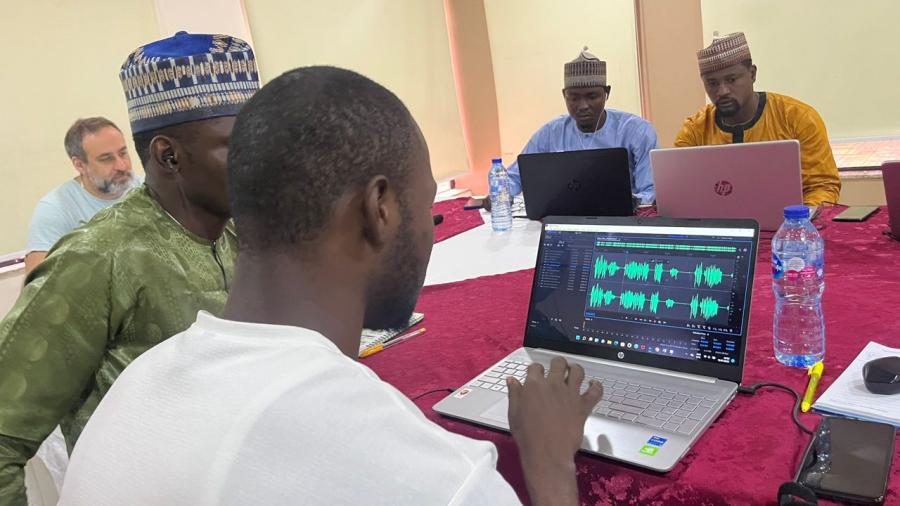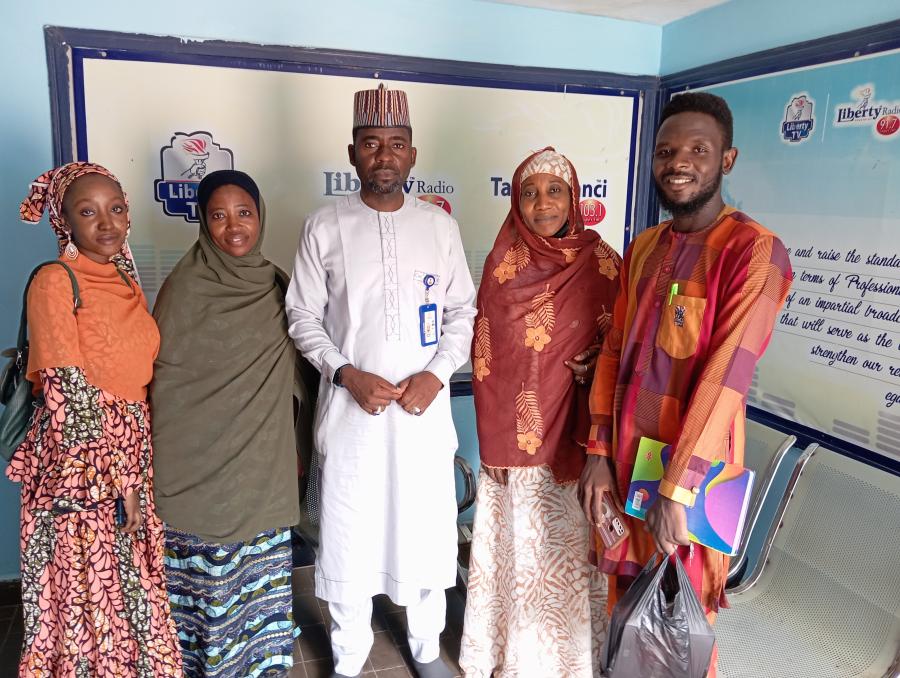Choices for northern Nigerian women
Of Nigeria's nineteen states, those in the Muslim north have lagged far behind the others in providing Western education. This situation has been cited as one of the causes of Nigeria's civil war, and as the basis for inequitable access to many occupational opportunities. Successive Nigerian governments have attempted to remedy this situation and in 1976 the military government launched a massive program of Universal Primary Education (UPE). The proceeds of the oil boom were to be poured into educational programs, particularly in the north, with the aim of enrolling all children in primary school by the end of the decade. But Nigeria's oil income has not met the expectations put forth in the development plan under which UPE was conceived, and the program has fallen far short of its original goals. Nevertheless, many children have started going to school and social changes are already apparent.
The dearth of Western education in the north of Nigeria before UPE was largely due to a colonial policy which specifically prohibited Christian missions - the main providers of Western education during the colonial period - from working in the north. Islamic education was, and continues to be, almost universal in the region; Islamic values have often been blamed for the "resistance" to Western education in the area. But the response to UPE clearly demonstrated that "resistance" was more apocryphal than real, at least when the education of males was in question. Families flocked in great numbers to enroll their sons in school. Those who resisted education for boys in the name of Islam were a tiny minority, usually the poorest in society.
The situation for girls is very different, however. A close look shows that it is not Islam, per se, which accounts for the resistance to Western education for girls. In fact a number of local Islamic leaders cited the writings of the 19th century reformer 'Uthman dan Fodio himself to support the notion that women should be educated. Even when Islamic ideology is used as the rationale for resisting Western education for women, the real basis for the resistance is the socioeconomic position of women, the institution of marriage as practiced in the region - and all its associated values - the roles of children which support the sexual division of labor and the restrictions under which women live. There is evidence, however, pointing to change. Not only are women beginning to go to Western school (both girls and boys attended Koranic school in the past and continue to do so), but profound changes in the social system follow this development. In order to understand these changes one must examine in some detail the division of labor in the household and the changes occurring in the traditional marriage system and in the roles of children.
Among the Hausa, the predominant linguistic and ethnic group in northern Nigeria, the Islamic practice of purdah, or seclusion, is virtually universal. In most families married women do not go outside of their homes except to obtain medical care, attend specific ceremonies (with their husband's permission), or occasionally visit relatives. In general women stay at home and depend upon children for virtually all of their communication with the outside world. Children escort women when they do go out; they shop and deliver goods and messages for women. While many women do have income-producing occupations from within the confines of purdah, such as cooking food for sale, trading raw materials, or sewing, they rely on children for procuring goods and selling their products. Street trading is a full-time occupation for many children: almost all these children are trading under the auspices of secluded women.
The enrollment of girls in school poses a severe, if indirect, threat to the institution of purdah. Since Hausa women are so dependent on children, physically removing them from the home threatens to leave women, except those wealthy enough to employ adult servants, without help. In a five-year study of the economic roles of women and children, we found that women who had children helping them with trade had significantly higher incomes than those who did not. In fact, it is in the neighborhoods where women do the most active trading that resistance to Western education for girls is most intense.
The most common reason given for the street trading activities of many Hausa girls is that the proceeds are saved for the girl's dowry. Hausa women's first marriages (many women are divorced and second marriages are less elaborate) are characterized by an extensive series of gift exchanges between the bride's and groom's families and within each family. A girl's relatives provide her with a large quantity of household goods including furniture, which comes from her father, and masses of bowls and pots, which come from female relatives and from her own earnings. These bowls are an important asset for the new bride, and they remain hers to use or sell or pass on to her own daughters. In most cases, the hawking done by young girls is seen as a means of earning this dowry.
The traditional age of marriage for Hausa girls is around eleven or twelve, although child betrothal at a younger age occurs. Most parents deem it imperative that their daughters marry by puberty; there is a great fear that delaying marriage will place the girl's chastity, and hence her marriage prospects, at risk. Since girls enter purdah upon marriage, "childhood" among Hausa girls ends by age eleven or twelve, often earlier. The notion that girls might attend school until the age of seventeen or eighteen is obviously in conflict with the values of this social and cultural system.
There are, then, three interrelated factors which explain the resistance that has been noted among the Hausa to Western education for women: the early age of marriage for girls (men marry when they are able to support their families, in their mid-twenties to early thirties), the dependence of married women on children, and the need for girls to earn money to purchase their dowries. These factors combine to make Western education and marriage appear to be alternatives to many people.
Until the mid-1970s, when attitudes began to change, most Hausa people regarded Western education for women as a very risky prospect, and few families competed for space in the existing girls' boarding schools. After the inception of UPE attitudes began to change, although not in all sectors of the population simultaneously. In those families where men already had some Western education, and where secluded women did not engage in occupations that required the constant assistance of children, girls were enrolled in school. Whereas in 1976 most people claimed that their daughters would not go to post primary school; in 1981 when we conducted a follow-up survey, most of these girls were, surprisingly, still in school.
This first generation of school attenders had not only enrolled in secondary school but had passed the traditional age of marriage. This dramatic development can be explained only with reference to local and national government policies which actively campaigned for women's education and which financed and built many boarding schools for girls. With boarding schools many families were able to accept the risk of delaying marriage. Moreover, the increase of Western education for men meant that many men were interested in women with some education.
The acceptance of Western education for women is by no means universal in northern Nigeria. In those families where education for boys is just starting, education for girls remains at least a generation behind. Moreover, in families where women actively trade with the assistance of children, resistance continues. Five years after our original study of one hundred children, we found that every girl who had not been enrolled in primary school was married and in seclusion by age twelve.
Patterns of sexual inequality are extremely entrenched in northern Nigeria. However, it is already apparent from observations over only five years that girls are being sent to school and kept there beyond the traditional age of marriage. This delays entry into purdah and gives young women a few more years to experience the nondomestic aspects of society. Such experience could lead to resistance to purdah and to a desire for higher education on the part of northern Nigerian women. Inevitably, this has long-range implications for the local and national economy; it will remove many women from occupations that service a rigid sexual division of labor and a rigid division of male and female social space. It could place women in line for jobs in the formal sector and lead to a whole sequence of demands and changes which are still quite remote from the perspective of most Third World women.
Article copyright Cultural Survival, Inc.


